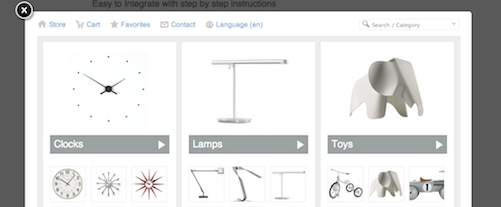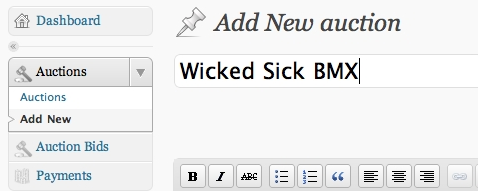Perhaps if there had been a Christmas episode of Firefly, Kaylee would have made a gingerbreadish version of her home, the starship Serenity, out of some ghastly protein substance. But this gingerbread Serenity looks plenty good enough to eat. More »
Kamis, 20 Januari 2011
These Apps Are Rampantly Stealing Your Info Without Permission [Privacy]
I love Pandora. I really couldn't do without it. But I could do without its sending my demographic information, phone ID, and location to eight trackers across six companies. And Pandora's far from the worst offender, the WSJ shows us. More »
Progress in Algorithms Beats Moore’s Law
Every so often Lance tweets about some science policy report. My natural tendency, like any good techie, is to keep my distance from such reports. I do recognize that they serve an important social function (like dentists or lawyers) but personally I would want to have as little as possible to do with them. However, I do sometimes skim over them, trying to gain some fuzzy insight or point of view. Here is an observation I picked from the Report to the President and Congress: Designing a Digital Future: Federally FUnded R&D in Networking and IT:
Everyone knows Moore’s Law – a prediction made in 1965 by Intel co-founder Gordon Moore that the density of transistors in integrated circuits would continue to double every 1 to 2 years. (…) Even more remarkable – and even less widely understood – is that in many areas, performance gains due to improvements in algorithms have vastly exceeded even the dramatic performance gains due to increased processor speed.
The algorithms that we use today for speech recognition, for natural language translation, for chess playing, for logistics planning, have evolved remarkably in the past decade. It’s difficult to quantify the improvement, though, because it is as much in the realm of quality as of execution time.
In the field of numerical algorithms, however, the improvement can be quantified. Here is just one example, provided by Professor Martin Grötschel of Konrad-Zuse-Zentrum für Informationstechnik Berlin. Grötschel, an expert in optimization, observes that a benchmark production planning model solved using linear programming would have taken 82 years to solve in 1988, using the computers and the linear programming algorithms of the day. Fifteen years later – in 2003 – this same model could be solved in roughly 1 minute, an improvement by a factor of roughly 43 million. Of this, a factor of roughly 1,000 was due to increased processor speed, whereas a factor of roughly 43,000 was due to improvements in algorithms! Grötschel also cites an algorithmic improvement of roughly 30,000 for mixed integer programming between 1991 and 2008.
From tables to 5 star linked data
The goal and vision of the Semantic
Web is to create a Web of connected and interlinked data (items)
which can be shared and reused by all. Sharing and opening up “raw
data” is great; but the Semantic Web isn’t just about
sharing data. To create a Web of data, one needs interlinking
between data. In 2006, Sir Tim Berners-Lee introduced the notion of
linked data in which he outlined the best practices for creating
and sharing data on the Web. To encourage people and government to
share data, he recently developed the following rating system -
which can be shared and reused by all. Sharing and opening up “raw
data” is great; but the Semantic Web isn’t just about
sharing data. To create a Web of data, one needs interlinking
between data. In 2006, Sir Tim Berners-Lee introduced the notion of
linked data in which he outlined the best practices for creating
and sharing data on the Web. To encourage people and government to
share data, he recently developed the following rating system -
The highest rating is for the data
that can link to other people’s data to provide context. While the
Semantic Web has been growing steadily, there is lot of data that
is still in raw format. A study by Google researchers shows that there are 154 million
tables with high quality relational data on the world wide web. The
US government along with 7 other nations have started sharing data
publicly. Not all the data is RDF or confers with the best
practices of publishing and sharing linked data.
Semantic Web has been growing steadily, there is lot of data that
is still in raw format. A study by Google researchers shows that there are 154 million
tables with high quality relational data on the world wide web. The
US government along with 7 other nations have started sharing data
publicly. Not all the data is RDF or confers with the best
practices of publishing and sharing linked data.
Here in the Ebiquity Research Lab,
we have been focusing on converting data in tables and spreadsheets
into RDF; but our focus is not on generating just RDF, but rather
generate high quality linked data (as now Berners-Lee calls it
“5 star data”). Our goal is to build a completely automated
framework for interpreting tables and generating linked data from
it.
into RDF; but our focus is not on generating just RDF, but rather
generate high quality linked data (as now Berners-Lee calls it
“5 star data”). Our goal is to build a completely automated
framework for interpreting tables and generating linked data from
it.
As part of our preliminary
research, we have already developed a baseline framework which can
link the table column headers to classes from ontologies in
the linked data cloud datasets, link the table cells to entities in
the linked data cloud and identify relations between table columns
and map them to properties in the linked data cloud. You can read
papers related to our preliminary research at [1]. We will use this
blog as a medium to publish updates in our pursuit of creating
“5-star” data for the Semantic Web.
link the table column headers to classes from ontologies in
the linked data cloud datasets, link the table cells to entities in
the linked data cloud and identify relations between table columns
and map them to properties in the linked data cloud. You can read
papers related to our preliminary research at [1]. We will use this
blog as a medium to publish updates in our pursuit of creating
“5-star” data for the Semantic Web.
If you are data publisher, go grab
some Linked Data star badges at [2]. You can show your support to
the open data movement by gettings t-shirts, mugs and bumper
stickers from [3] ! (all profits go to W3C)
the open data movement by gettings t-shirts, mugs and bumper
stickers from [3] ! (all profits go to W3C)
Happy Holidays ! Let 2011 be yet
another step forward in the open data movement !
New Year's Resolutions
I drew this comic at the dawn of 2010. Here's how the somewhat autobiographical resolutions in the first panel turned out: I've failed miserably at getting organized. I still floss every night, as any non-hypocritical dental student should. I've written poetry, but it's been mostly goofy light verse. I've enjoyed ethnic food, smiled, practiced yoga, worked out, and volunteered, but only sporadically. I've enjoyed literary fiction (as pretentious as that sounds), especially the novels of Haruki Murakami. I can't bike to work - I'm not employed. And finally, I never actually quote bad movies - I only quote great movies that other people think are bad. My resolution for 2011: to keep going back and coloring old comics so I can repost them on my blog and make them available as posters.
21 E-Commerce Plugins and Shopping Carts for WordPress 3.0+
Want to start the new year off by turning your WordPress website into a full-fledged online store? You’re in luck – WordPress has a wide range of options available. We’ve put together a list of e-commerce plugins and carts that work with WordPress 3.0+, as well as a short introduction to each to help you narrow down your options. These are in no particular order. Some are free and some are premium, but what they all have in common is that they’ve been fairly recently updated for the latest version of WordPress.
MarketPress
MarketPress is the only e-commerce plugin designed from the ground up for seamless integration with WP Multisite and BuddyPress, enabling you to create a single store or a network of stores. It’s packed full of features so that you can manage everything related to your transactions through the WordPress dashboard.
WP E-Commerce

This free plugin is used by thousands of WordPress sites. It’s a shopping cart that lets customers buy your products, services and digital downloads online. Premium upgrades are available for additional features beyond what the free version offers.
eShop

eShop is a free plugin available in the WordPress repository and is fairly regularly updated. It is Multisite-compatible and includes several merchant gateways right out of the box: Authorize.net, Paypal, Payson, eProcessingNetwork, Webtopay, iDEAL and Cash/Cheque. Despite it’s lack of screenshots, the plugin is packed full of features worth checking out.
ShopperPress

ShopperPress is a premium cart for WordPress that comes with 20+ to choose from and 20+ built in payment gateways. The software boasts one-click setups, personalized user accounts, easy management tools, detailed sales tracking, promotional options, a variety of product import tools, and many more features.
PHPurchase

PHPurchase is a premium solution that allows you to sell digital and physical products, collect recurring payments for subscriptions, memberships, and payment plans.
StorePress

StorePress is a premium WordPress theme, fully coded and packed with scripts that will allow you to transform your WordPress blog into a veritable e-commerce virtual store.
shopp

Shopp is a premium plugin that adds a feature-rich online store to your WordPress-powered website or blog. Gateways and shipping options are also available as premium add-ons.
YAK for WordPress

YAK is a free, open source shopping cart plugin for WordPress. It associates products with pages or posts and handles different types of products through categorization. Purchase options include cheque or deposit, basic credit card form, basic Google Checkout integration, standard PayPal integration, PayPal Payments Pro, and Authorize.net.
Dippsy

Dippsy stands for DIgital Products PayPal Store for You. Use it to sell music, e-books, software, pictures, videos or anything that can be stored digitally. Read more about the plugin in our recent review.
WP Auctions

WP Auctions is a free plugin which allows you to host auctions on your blog or website and to sell products. It uses an attractive AJAX powered popup and setup can be accomplished in just a few minutes.
WordPress Simple Paypal Shopping Cart

If you need a simple shopping cart with PayPal for taking payments, then this may be the plugin for you. It places an ‘Add to Cart’ button on any posts or pages. It also allows you to add and display the shopping cart on any post or page or sidebar.
Ecwid Shopping Cart

Ecwid is a free full-featured shopping cart and an e-commerce solution that can easily be added to any blog or Facebook profile. “Ecwid” stands for “ecommerce widgets”. The most notable thing about this shopping cart is that it has AJAX everywhere and supports drag-and-drop.
WordPress Shopping Cart Plugin

This is a premium plugin that comes with a wide variety of features that seamlessly integrate an online shop with a fully functional shopping cart interface into any WordPress website.
Interspire and BigCommerce

This is a free plugin that allows you to integrate the Interspire Shopping Cart & BigCommerce hosted ecommerce shopping carts into your WordPress site. It allows you to easily find and link to your Interspire or BigCommerce products from within WordPress.
FoxyPress

This is a free e-commerce plugin for FoxyCart to easily add items to your WordPress posts or pages. Add items through the WYSIWYG Editor or shortcode.
wpStoreCart

wpStoreCart is a free, open source, and full featured e-commerce platform built atop of WordPress. It is easy to use, lightweight, heavily supported and constantly updated with new features.
Volusion
Wazala Ecommerce Store & Shopping Cart

Wazala is a hosted ecommerce and shopping cart solution. This plugin facilitates the integration of your Wazala store within your WordPress site. The plugin adds a simple and beautiful store button to your website. When clicked the customer will have a shopping experience right within your own site.
LBAK Google Checkout

The LBAK Google Checkout plugin is aimed mainly at small projects that just want to sell a few things on their blog through Google Checkout and don’t want too much else apart from ease of use.
Image Store

Image Store is an image gallery and store plugin for WordPress with a slideshow and PayPal integration. This is a nice simple solution for photographers or anyone strictly selling images. It includes easy FTP folder import, watermarks and dynamic generation of several photo effects along with the e-commerce functionality.
Prospress
Langganan:
Komentar (Atom)







